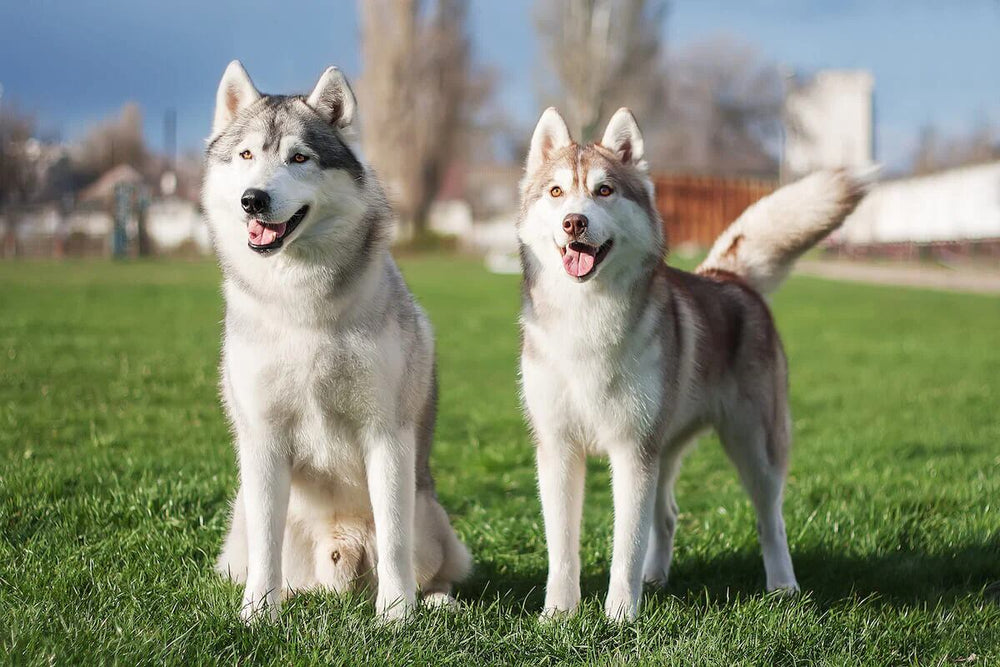The husky life expectancy is 12-15 years old. They're a healthy breed for their size — most medium to large dogs live closer to 10-12 years. But in either case, we want to get as much time with our best friends as we can. And as dog owners, we can play a role in extending our pets' lifespans as much as possible.
While not everything is in a husky owner's control, you can help your best friend lead a healthy life by making sure they eat a balanced diet, get plenty of exercise, and undergo regular vet checkups. Whenever you adopt a purebred dog, choosing a good breeder is also important.
We'll go over the factors that affect the husky lifespan, share tips for keeping your pet healthy, and explain the most common husky health problems to discuss with your vet.
What Factors Affect the Husky Life Expectancy?
Genetics and lifestyle will play the biggest roles in your husky dog's longevity. Here are the factors that affect husky life expectancy and the steps you can take to ensure your best friend gets their best start and lives their best life.
Breeding

Choosing a responsible breeder — one who selects dogs based on their health and temperament, who runs genetic health screenings on all the dogs they breed, and who socialize their husky puppies from an early age — will help reduce the likelihood that your dog will have inherited issues.
Genetic testing won't rule out 100% of the diseases that could affect your dog, but it will test for the most common issues that affect the Husky breed.
Breeder Certifications
The American Kennel Club (AKC) offers a variety of breeder certification programs to help you identify a reputable breeder. Anyone certified as a Breeder of Merit or as part of the Bred with H.E.A.R.T. Program performs the AKC recommended health screenings for their breed.
You can also find good breeders without these certifications, but you will have to screen them yourself by asking lots of questions.
Breeders of Siberian vs. Alaskan Huskies
Only Siberian huskies are an AKC-recognized breed. So, if you're adopting an Alaskan Husky, you won't be able to find an AKC-certified breeder or enter your dog into AKC dog shows.
Neither of these facts makes your husky any less healthy or less lovable than a Siberian husky. But it does mean that you'll have to carefully screen your breeder by yourself — there will be no certification programs to help you along the way.
Overbreeding
One more thing to watch out for is overbreeding. Huskies are the 16th most popular dog breed in America, and whenever a breed gets that popular, they're at risk for overbreeding. This occurs when breeders begin to mate more dogs at a faster pace in order to keep up with demand. It often leads to inbreeding, the breeding of less healthy dogs, or the breeding of dogs that haven't been temperament tested. The result is less healthy puppies and a shorter husky life expectancy.
While overbreeding isn't as big of a problem with huskies as it is with more popular breeds like the German shepherd or golden retriever, it is still a risk. If you ensure your breeder runs genetic health screenings on both parent dogs and you ask about the lineage of the parents, you'll be better able to identify a reputable breeder who is interested in preserving the health of the husky breed.
Diet

Much like how diet plays an important role in your health, it also plays a role in husky life expectancy. Huskies should eat a complete and balanced diet that is rich in nutritious whole foods, including meat, various fruits, vegetables, and whole grains.
While there's ongoing debate about whether kibble, wet, raw, or homemade cooked dog food is better for our pets, there isn't enough scientific evidence to support one type of food over the others. So, as dog owners, we just have to do our best.
The most important thing to look for in a dog food is a recognizable protein source as the first ingredient along with other whole foods in the ingredient deck. If you're choosing dog food from the pet store, be wary of grain-free recipes, which are under investigation by the FDA for potentially causing an increased risk of heart disease in dogs. Pulses — like beans, peas, and lentils — are the main suspect, so avoid these ingredients until the FDA knows more about the risks.
Make sure store-bought dog food meets the AAFCO (Association for American Feed Control Officials) standards for a complete and balanced diet. And if you're making your dog's food from scratch, work with a veterinary nutritionist to ensure your dog is getting all the nutrients they need.
While we may not know if dry, wet, raw, or homemade food has any impact on our pet's lifespans, we know one thing for sure: Obesity can decrease the lifespan of a husky and any other dog breed by up to two and a half years. Make sure to keep your dog at a healthy weight throughout their life by monitoring their food intake. Work with your veterinarian if you think your pup needs to be put on a weight loss plan.
Exercise

Huskies were bred to be working dogs, pulling sleds long distances across the Arctic. This is an active dog breed, and it needs plenty of exercise. The AKC rates the husky's playfulness level as "nonstop" and their energy level as "high."
Make sure your husky has an opportunity to run each day. This will not only increase their quality of life, but can also increase the husky life expectancy. Gentle exercise can decrease the symptoms of arthritis and other mobility issues in dogs. And the longer your dog stays mobile, the longer they will stay healthy.
If you live in a cold climate, you can take your husky to sled dog training to keep them active in the winter and help them explore their working dog instincts.
Regular Vet Checkups

Regular vet checkups ensure your dog is up-to-date on vaccinations and preventative medicine. This helps your dog avoid painful and preventable causes of death like rabies, distemper, heartworm, Bordetella, parvovirus, or hepatitis.
Your veterinarian can also help you monitor your husky for signs of the most common health concerns to affect the breed. Early identification and treatment of health issues can help increase the husky life expectancy.
Common Health Issues for Huskies
As we mentioned, the husky is a healthy dog breed. Most of the conditions huskies are prone to affect their quality of life more than their life expectancy. One of the main health conditions to look for in huskies is hip dysplasia.
While hip dysplasia isn't a cause of death, it can shorten the husky life expectancy because it contributes to lameness. A lame dog isn't able to live an active life, which decreases its life expectancy.
The AKC recommends breeders get a hip joint evaluation before breeding their male and female huskies. Ask breeders if they do this health screening before you purchase your husky puppy. Then, support your husky's long-term joint health with omega-3 fish oil and natural pain-relief supplements.
Other than hip problems, huskies can also suffer from a variety of eye problems. While none of these health issues are fatal, they can decrease your pet's quality of life and make them less active because they will feel less confident moving around. Here are the most common eye problems in huskies:
- Juvenile cataracts: This disorder can make the lens of your husky's eye look opaque. It makes it harder for your dog to see because less light gets to their retina.
- Corneal dystrophy: Similar to cataracts, this health issue causes a dog's corneas to become opaque and can lead to decreased vision.
- Progressive retinal atrophy (PRA): More common in male huskies, this genetic disorder causes your dog's vision to slowly deteriorate, leading to blindness.
- Glaucoma: Your dog could experience sudden or gradual loss of vision due to an increase in eye pressure caused by this disease.
The AKC recommends breeders get an ophthalmologist's evaluation for all breeding huskies. Your vet should also check your husky dog's eyes at your checkups. If eye problems develop, you can work with a veterinary ophthalmologist to get specialized care for your best friend.
So, How Long Do Huskies Live?

Huskies are typically healthy pups that live around 12-15 years. This is longer than many breeds, but as dog owners, we know that every minute you spend with your best friend is precious.
You can give your husky the best start by working with a responsible breeder who gets health screenings for their dogs before breeding. Once you bring your husky puppy home, you can help them lead a happy and healthy life by feeding them a high-quality dog food, giving them regular exercise, and never missing a vet checkup. You can also protect the joints of this active dog with a fish oil supplement. All of these steps can contribute to a longer husky life expectancy.
To learn more about your pet's health and wellness, visit the Native Pet blog.

